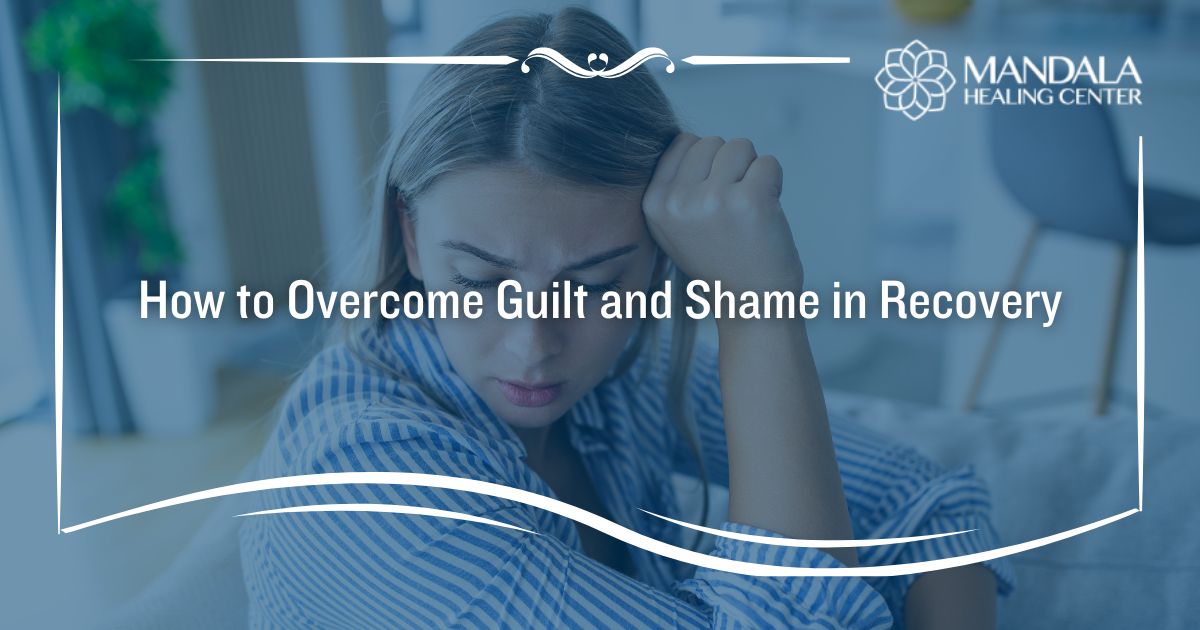If you are struggling with addiction, you are not alone. According to the Substance Abuse and Mental Health Services Administration (SAMHSA), 48.5 million people suffered from a substance use disorder in 2023.[1]
It is common to believe that everything will be better after you complete addiction treatment. While your quality of life will greatly improve, there will still be things to overcome. Oftentimes, people in early addiction recovery suffer from negative thoughts and feelings of guilt and shame.
Guilt and shame are powerful emotions. If you are struggling with feeling guilty or like you are a bad person, it’s time to work on overcoming those emotions. The impact of shame in addiction recovery can be intense, preventing you from truly enjoying your newfound sobriety.
While addiction is not a fun experience, it does not make you a bad person. Overcoming guilt and shame can be difficult, but it is possible. The easiest ways to cope with these common emotions include practicing self-acceptance or forgiveness, living in the present, making amends, building positive relationships, and using your guilt as motivation.
In this article, you will learn:
- What causes guilt and shame in recovery?
- How can you work through shame and guilt after addiction?
- What are the benefits of overcoming guilt and shame?
Why Do You Feel Shame and Guilt in Recovery?
Guilt is described as feeling like you deserve blame for your actions, while shame is feeling unworthy or inferior because of past actions, thoughts, or experiences. People in recovery from addiction often experience both emotions at the same time.
The main reason people in recovery experience guilt is because they are becoming aware of how their substance abuse affected others during their addiction. While it is normal to feel guilty about your past behaviors, it isn’t helpful. Instead of allowing guilt to consume you, you should take responsibility for your actions, make amends, and avoid repeating the behaviors.
Shame often arises because, during addiction, you might engage in activities you wouldn’t if you were sober. For example, you might steal, lie, cheat, or engage in criminal behaviors to obtain drugs. While it is normal to feel ashamed of these actions, it is always best to work through your emotions and remember that addiction caused you to behave differently than your actual morals.
How to Overcome Shame and Guilt After Addiction
Dealing with negative emotions like guilt and shame is never easy and it isn’t beneficial to your recovery process. Guilt and shame could begin to impact your relationships with others and the way you interact with the world. In other words, without using healthy coping skills, guilt and shame can consume you.
Thankfully, there are plenty of ways to overcome these feelings, including:
- Self-Acceptance and Forgiveness- Practice self-acceptance and forgiveness by remembering you are human, you make mistakes, and the only thing you can do is to learn from them and get better each day.
- Live in the Present- Guilt and shame arise from ruminating on your past. Now that you are recovering, you should focus on the present. You can learn how to live in the present by practicing mindfulness techniques.
- Make Amends- Part of overcoming guilt is making amends for past harms inflicted on others. By apologizing for your behaviors and promising to do better in the future, you will lessen the level of guilt you experience.
- Build Positive Relationships- If you are dealing with shame, that means you are feeling unworthy. By building positive relationships with others, you can begin to learn that you are worthy of love and acceptance from people around you.
- Use Guilt as Motivation- Guilt and shame can be used as motivation to make positive changes in your life. Instead of ruminating on these emotions, use them as an incentive to start making amends, changing negative behavioral patterns, and being a better person in general.
What are the Benefits of Working Through Guilt and Shame?
When you work through your guilt and shame, your overall quality of life will improve. You will get farther in your recovery process, start experiencing more positive emotions daily, and learn how to have healthier relationships with the people around you.
The main benefits of overcoming shame, guilt, and other negative feelings include:
- Being more inclined to engage in relationships with others
- Cooperating with others and experiencing deeper empathy
- Developing self-correcting behaviors that reduce your risk of relapsing
- Gaining motivation necessary for making positive life changes
- Learning problem-solving skills that you can use to overcome other challenges in recovery
- Repairing relationships with people who can provide you with support and community, combating isolation that can lead to relapse
- Seeing in real-time how healthy coping mechanisms improve your life
Get Connected to a Drug and Alcohol Rehab Center
If you or a loved one suffers from addiction, it’s time to seek professional help. At the Mandala Healing Center, we offer a combination of evidence-based and compassionate addiction care. In other words, you’ll receive the tools and support you need to recover in a way that feels comfortable and accepting.
Contact us today to learn more about how our addiction treatment program can help you overcome guilt and shame.
References:
- The Substance Abuse and Mental Health Services Administration (SAMHSA): Highlights for the 2023 National Survey on Drug Use and Health
















